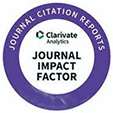SYNTHESIS OF 4-(4-METHOXY-PHENYL)-3-BUTENE-2-ON AND THE ACTIVITY TEST AS A FRUIT FLIES ATRACTANT
Deni Pranowo(1*), Edhi Martono(2), Suputa Suputa(3), Muchalal Muchalal(4), Tutik D. Wahyuningsih(5), M. Yusuf Afandi(6)
(1) Department of Chemistry, Faculty of Mathematics and Natural Sciences, Universitas Gadjah Mada, Sekip Utara, Yogyakarta 55281
(2) Department of Entomology and Phytopathology, Faculty of Agriculture, Universitas Gadjah Mada, Sekip Utara Yogyakarta 55185
(3) Department of Entomology and Phytopathology, Faculty of Agriculture, Universitas Gadjah Mada, Sekip Utara Yogyakarta 55185
(4) Department of Chemistry, Faculty of Mathematics and Natural Sciences, Universitas Gadjah Mada, Sekip Utara, Yogyakarta 55281
(5) Department of Chemistry, Faculty of Mathematics and Natural Sciences, Universitas Gadjah Mada, Sekip Utara, Yogyakarta 55281
(6) Department of Chemistry, Faculty of Mathematics and Natural Sciences, Universitas Gadjah Mada, Sekip Utara, Yogyakarta 55281
(*) Corresponding Author
Abstract
4-(4-methoxyphenyl)-3-buten-2-on has been synthesized from p-anisaldehyde and acetone via aldol condensation. The reaction was performed at room temperature under basic condition for 12 hours to give brown solid of product (m.p 64-65 oC) in 66.19 % yield. p-anisaldehyde itself was produced from oxidation of anetol major component of anise oil by the use of potassium permanganate as a oxidator. The structure of the products was analyzed by FTIR, 1H NMR and GC-MS. Activity test of 4-(4-methoxyphenyl)-3-buten-2-on as an attractant was carried out in Sleman with methyl eugenol as a reference. The result showed that 4-(4-methoxyphenyl)-3-buten-2-on was inactive compound as a fruit flies attractant and some of fruit flies, i.e. Bactrocera papayae, B. carambolae, B. umbrosa and B. abdolonginqua was found on the test area.
Keywords
Full Text:
Full Text PdfReferences
[1] Asri, A., 2003, Membuat Perangkap Lalat Buah, Tabloid Sinar Tani, edisi 9 April 2003.
[2] Alfarini, P., 2003, Produk Hortikultura Indonesia Terancam Ditolak Taiwan, www.tempo interaktif.com, diakses pada 25 Maret 2005.
[3] Shelly, T.E., Pahio, E., , and Edu J., 2004, J. Florida Entomologist, 87(4), 481-48.
[4] Jacobson, M., Keiser, I., Harris, E.J., and Miyashita, H., 1976, J. Agric. Food Chem., 24(2), 782-783.
Article Metrics
Copyright (c) 2010 Indonesian Journal of Chemistry

This work is licensed under a Creative Commons Attribution-NonCommercial-NoDerivatives 4.0 International License.
Indonesian Journal of Chemistry (ISSN 1411-9420 /e-ISSN 2460-1578) - Chemistry Department, Universitas Gadjah Mada, Indonesia.











